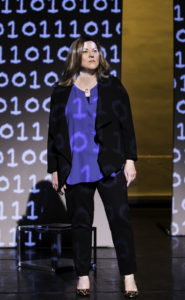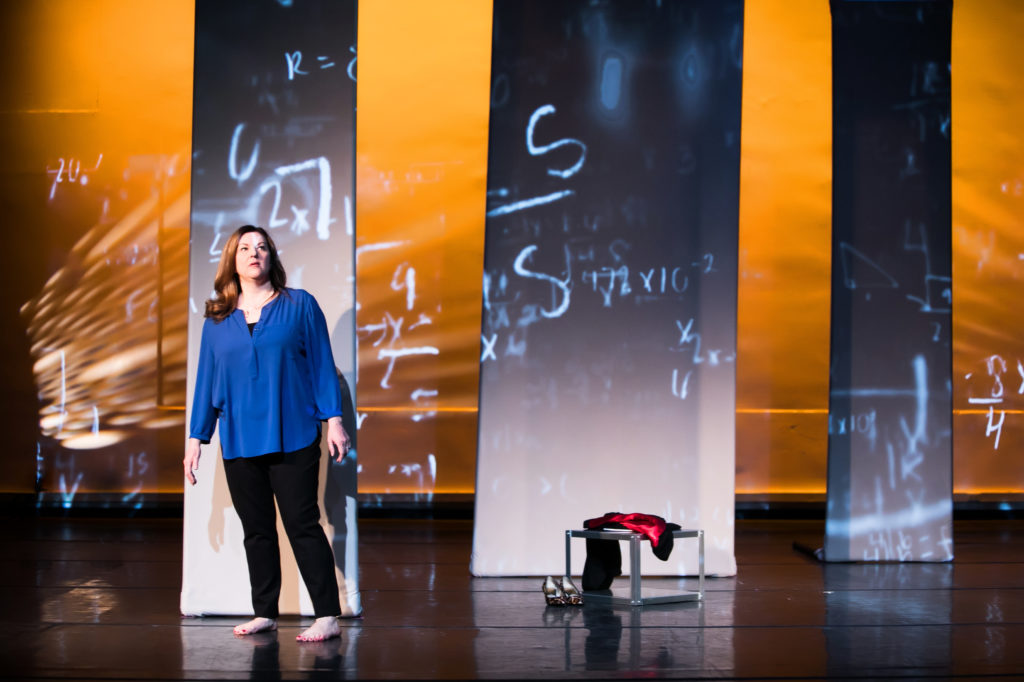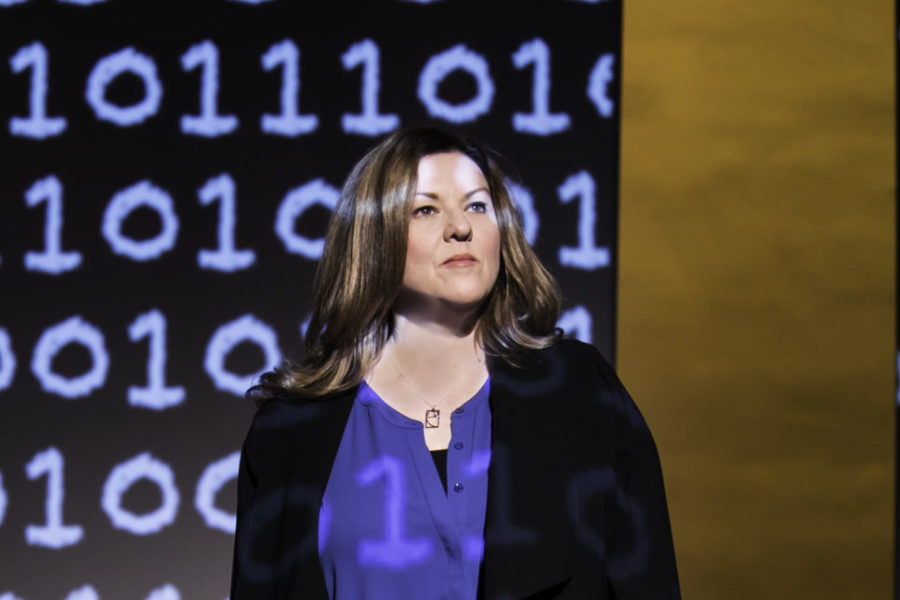
Photo: Silvana Ximena/courtesy of Central Square Theater
No safety in numbers: Gioia De Cari gets personal in her show Truth Values: One Girl’s Romp Through MIT’s Male Math Maze
In the early ’90s, Gioia De Cari was studying for her Ph.D. in mathematics at MIT. Now she’s a professional actress. This radical career shift was prompted in part by the extreme sexism she experienced during her years in STEM.
At the time women only made up about 23 percent of the workforce in STEM industries, according to the United States Census Bureau. That number has grown to just 29 percent since.
For years De Cari kept her background in math to herself, until 2005, when Lawrence Summers, former president of Harvard, publicly stated that men were more genetically inclined to STEM work.
Fast forward and De Cari is sharing her infuriating yet hilarious journey on stage in her one-woman show Truth Values: One Girl’s Romp Through MIT’s Male Math Maze.
The 75-minute performance is a poignant look at our passions and what we will endure to pursue them. Updated from her original 2009 version, the show runs at the Central Square Theater through Sept. 23. And De Cari is making it very clear: She will not be silent any longer.
It’s a million tiny cuts and a million tiny struggles that, on their own, don’t seem like much…But when you take them as a whole, it starts to wear you down, like the straw that breaks the camel’s back.

Photo: Silvana Ximena/courtesy of Central Square Theater
Far from equal: De Cari used clothing to try to level the gender playing field while at MIT

Exhale: What prompted you to write this play about your experience?
Gioia De Cari: I had no intention of sharing my stories about my time in math. Then the Larry Summers controversy came along. But what really pushed me over the edge was what I read about Nancy Hopkins, who was a biology professor at MIT (and) was the one who was there in the room during his talk. And she got up and left in the middle of it, saying if she hadn’t, she would have either blacked out or thrown up. After the incident, I found article after article eviscerating her for having said that. It was horrifying. And to be honest, that was what really caused me to rethink whether I did want to share these stories. I thought, Well this is something I can contribute as an artist, and I’ve got to step up and do that.

How did the sexism you experienced affect your time at MIT?
One professor asked me to bring cookies to his seminar. I was the only woman who was really feminine looking so I really stuck out. I was also questioned about being married and why was I there at MIT if I was married. That happened more than once. I was hit on a lot wherever I went. It’s a million tiny cuts and a million tiny struggles that, on their own, don’t seem like much, or you can rationalize them away. But when you take them as a whole, it starts to wear you down, like the straw that breaks the camel’s back.

In the play you talk about using fashion as a form of protest. What role did appearance play in your experience?
I was so frustrated about what to wear. Because it was my habit when I came to MIT to dress very femininely. I was caught up in the Lady Diana look. Nobody else looked like that. I tried to dress like a lot of the other women who tried to blend in completely by wearing plaid shirts and jeans. But I’m super curvy so that was really a rough one for me. I started having nightmares about my femininity. It was terrible. So I started wearing more and more outrageous outfits to see what would happen.
One of the people on one of the post-show tour panels said they’ve found that in situations where people look like everyone else in whatever way, they tend to take one of two different strategies. One strategy is to blend in so they disappear. The other strategy is to get extremely flamboyant so they stick out. And that’s what I did.

How has the advent of the ‘Me Too’ movement changed the play or the reaction to it?
In 2016 I was toying with the idea of retiring the show because I was one of those who was just sure that we were going to have a woman president. And, of course, that was the antithesis of what happened. And then it occurred to me: If there’s any time to speak up it would be now, even more than before. We rejiggered it and updated it, given the political landscape. I keep hearing from audience members that they think it’s become even more relevant because of what’s going on.

What advice would you give to other women working in male-dominated fields?
One of my academic friends told me to check out this book called Every Other Thursday. It describes these women scientists who met every other Thursday for years and years and years to support each other in their careers. I joined a group of women entrepreneurs and it was just life changing. I’ve also been in groups (that) are mixed in gender. It’s just profoundly helpful. Had I had that when I was in grad school it might have been a different thing.



 4 min read
4 min read
